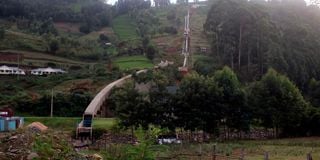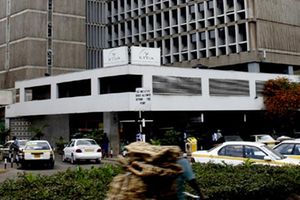
A section of the KTDA Gura hydro power project in Othaya in Nyeri County.
Small-scale tea growers in the West of Rift Valley are demanding answers from the Kenya Tea Development Agency (KTDA) regarding the fate of hydro-electric projects intended to benefit local tea factories.
The Setet hydro projects along the Chemosit and Kipsonoi rivers in Kericho and Bomet counties, respectively, were expected to benefit 11 KTDA factories once completed. In Kericho County, the projects will support Momul, Tegat, Kapkatet, Litein, Tebesonik, Chelal, and Toror factories, while in Bomet County, Kapset, Mogogosiek, Kobel, Kapkoros, Rorok, and Tirgaga will benefit.
Small-scale tea growers, through their respective factories, have contributed Sh1.1 billion over the past 10 years towards implementing these hydro projects, with an international lender raising Sh2 billion. Each of the seven parent factories - Kapkatet, Litein, Tegat, and Momul in Kericho, and Kapkoros, Mogogosiek, and Kapset in Bomet - jointly contributed Sh1.104 billion as equity for the project. According to a KTDA zonal director familiar with the deal, “Each factory contributed Sh138 million, matched by a similar amount from KTDA Power Company, which is a shareholder in the hydro projects.”
The remaining Sh2 billion, necessary to reach the Sh3 billion target, is provided by the International Finance Corporation (IFC), a member of the World Bank Group.
Initial capital
When contacted on Tuesday, KTDA promised a statement on the matter by Thursday. As of press time, it was unclear how much each farmer contributed or how many raised the initial capital. Succession issues involving families who sold land to the factories have hindered progress, as some were unable to surrender title deeds in the early stages, delaying funding.
“Lack of information from KTDA on the challenges facing the projects has been the main reason why farmers have repeatedly raised this issue,” said Mr William Kosgei, a small-scale tea grower from Tegat, Bomet East. “We hope KTDA will provide an update this time to ease the farmers’ anxiety.”
Mr Philiph Ngeno, a former KTDA zonal director, questioned why KTDA Power holds a stake in the projects when its role should be limited to management. “Why is KTDA Power a principal shareholder when the hydro projects should be fully owned by the individual factories?” he asked, adding that farmers should be informed about the interest rates on the loans taken for the projects, as this affects their earnings.
In the East Rift region, some hydro-electric projects have been funded with loans from the Cooperative Bank and Sidian Bank. Konoin MP Brighton Yegon has petitioned Parliament to investigate the issue, provide answers to affected farmers, and recommend compensation for the deductions made from their pay slips.
Mr Yegon filed a petition with the National Assembly on November 21, 2024, asking the Public Petitions Committee to seek answers from KTDA regarding the status of the projects. He called for a detailed report on the status of the hydro projects, including how the funds were invested and the reasons for the delays.
An estimated 680,000 small-scale tea growers in 19 counties supply tea to KTDA in two zones - West and East Rift Valley. “More than Sh3 billion has been deducted from smallholder farmers since 2014, particularly from those in Bomet and surrounding counties like Narok and Nakuru,” Mr Yegon stated in the petition.
Reduce operational costs
The projects’ completion was expected to reduce operational costs for the factories amid high electricity and fuel costs.
The MP also called for an investigation into alleged mismanagement of funds by the ministries of Agriculture and Livestock, Energy, and other relevant authorities.
Mr Daniel Kosgei, a farmer from Litein, Kericho, expressed frustration at the lack of progress. “None of the projects have been completed, and little information has reached the small-scale tea growers about their status. What was expected to reduce production costs and raise incomes has yet to materialise,” he said.
Ms Betty Mutai, a farmer in Kapkoros, Bomet, urged KTDA to expedite the projects. Mr Walter Cheruiyot, chairman of the Setet Hydro Electric Project, previously stated that construction and equipment installation would be completed by September 2024, but no further updates have been provided.
KTDA Chairman Mr Enos Njeru and Vice Chairman Mr Erick Chepkwony, elected last year, have stated that completing the projects will significantly reduce factory operating costs.









